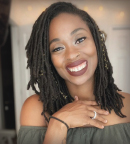I was a track and field athlete throughout college, and my goal was to try out for the Olympics, but cancer had other plans for me. In 2010, while in my senior year in college, I began having sharp, shooting pains in my shoulders, which I initially attributed to overzealous training. But the pain soon escalated to my chest and back, and it became so intense it felt like my whole body was on fire.
I saw my primary care physician who said I was training too hard. He prescribed muscle relaxants and pain medication, and when those drugs failed to give me relief, I met with the school physician who prescribed a nonsteroidal anti-inflammatory drug, which caused my body to break out in bruises and rashes. The bruising was so serious, one of my professors asked me if my boyfriend was physically abusing me.
Throughout this whole experience, I knew something was very wrong. But I was only 21, too young to feel scared. That feeling would come later.

Amanda Brunson
Living With Fear and Uncertainty
The pain finally became so unrelenting that I went to the hospital emergency room. There a nurse drew some blood, and a physician gave me morphine for the pain. The drug gave me the first relief I had had from pain in weeks, and I quickly fell asleep. But my peaceful respite was short-lived. The doctor woke me up and told me he had the results from my blood test. “I think you have leukemia,” he said and quickly left the room.
I had no idea what that diagnosis meant. My only experience with cancer was watching an episode of Charlie Brown when I was child. In it, Linus’ classmate is diagnosed with leukemia. I thought the diagnosis meant I was going to die. Now I felt fear.
The whole time I was in the hospital, I was faced with constant uncertainty. Another physician soon came into my room and told me to turn onto my stomach. The next thing I knew he was drilling a needle into my back, but he did not explain that he was performing a bone marrow biopsy or why it was necessary to have the test.
A few hours later, I learned I had acute lymphoblastic leukemia (ALL). Although I still wasn’t sure what the diagnosis meant, by nightfall, I was taken into surgery to have a chemotherapy port placed in my chest. I had no idea what the treatment plan was. I was only told that if I didn’t have treatment immediately, I would die.
Leaning on Faith to Get Through Cancer
Despite receiving an intensive chemotherapy regimen that included vincristine and methotrexate, I was determined to finish my senior year at college and graduate on time. I had no way of knowing then that it would take more than a decade to potentially cure me of this cancer.
Over the next 3½ years, I continued to receive intensive chemotherapy and numerous bone marrow biopsies to track the effectiveness of the therapy. During this time, I was determined not to let cancer derail me from my dream of competing in track and field events at the Olympics.
That dream ended when I learned that after achieving a brief remission, the cancer had recurred. It was during this time that I really leaned on my faith to get me through the next stage of my cancer journey.
Living With the Consequences of Cancer
In 2015, I had an allogeneic bone marrow transplant at Moffitt Cancer Center, which was successful in putting me in a durable remission, and today I remain cancer-free. However, cancer and its treatment have left their mark, and I’m still adjusting to my new life normal.
I have myriad health problems as a result of my therapy, including infertility and treatment-induced menopause, which have caused numerous sexual health issues and even problems with my teeth and eyesight. But I am not complaining. I’ve accepted the cards I’ve been dealt. I use my pain for purpose and am grateful to be alive.
Giving Back
My experience as a young adult with cancer has led me to become a patient advisor in the Patient and Family Advisory Program at Moffitt Cancer Center. I wanted to give back to the hospital that gave me back my life and to help other patients, especially adolescents and young adults with cancer, to receive the medical and emotional support they need throughout their survivorship.
Today, I try to live every day in the present, but I don’t know if that is a good or bad thing, because I still have to plan for my future. I’ve learned that life can change in a second, and I’m still trying to find the right balance between living each day as fully as I can while making progress toward my long-term goals.
Although everything about having cancer has been a challenge, I’ve also gained a lot from the experience. I am a much stronger, wiser, and confident person than I was before my diagnosis. I have greater appreciation of my loved ones and don’t take anything for granted.
We are all living on borrowed time. Having cancer is a lesson on using that time wisely.
Ms. Brunson lives in Orlando, Florida, and works in the fitness industry.
Editor’s Note: Columns in the Patient’s Corner are based solely on information The ASCO Post received from patients and should be considered anecdotal.

